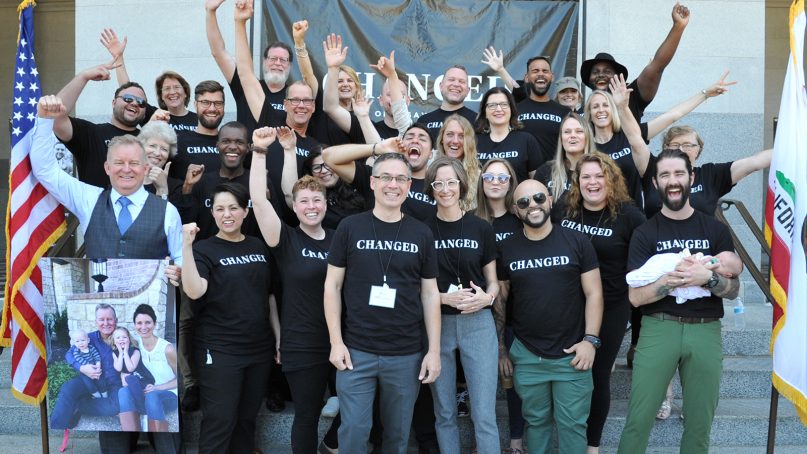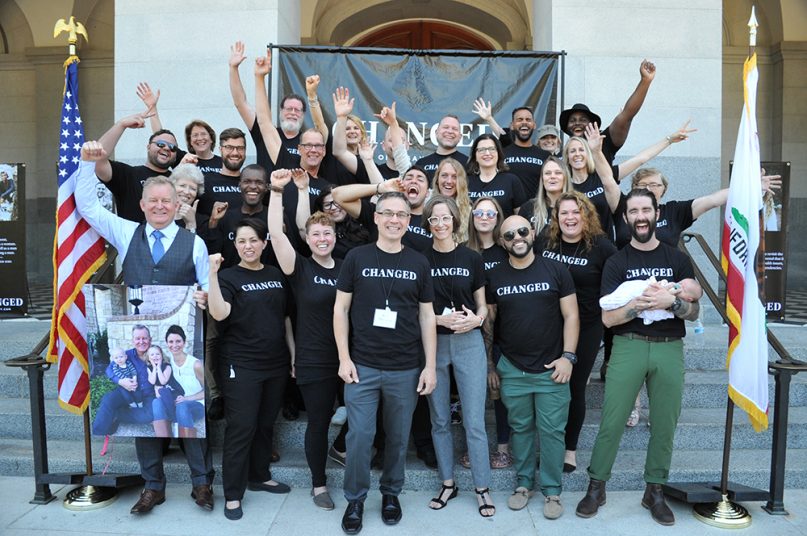
Pastors Ken William, center left, and Elizabeth Woning, center right, of Redding, California, in a group photo with other members of their CHANGED group. Courtesy photo
(RNS) — Elizabeth Woning and Ken Williams have a simple message to LGBTQ people: God can radically transform their sexual orientation. It’s the motto of their new campaign, “Changed Is Possible.”
If it sounds familiar, it’s because it is. “Change is possible” was the slogan of Exodus International, the interdenominational ex-gay Christian ministry that shut down in 2012 after its president, Alan Chambers, renounced conversion therapy, saying it did not work and was harmful.
Woning and Williams — she once considered herself a lesbian and he once considered himself gay — have added a “d” to “change” and have launched what they call “a community of friends who once identified as LGBTQ+.”
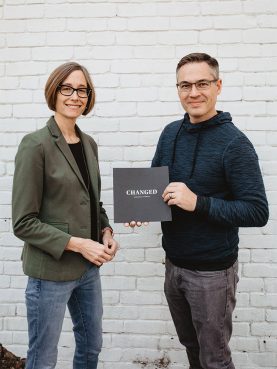
Pastors Elizabeth Woning and Ken Williams with their book, “CHANGED: #oncegay stories.” Courtesy photo
The two pastors at Bethel Church, an independent charismatic megachurch in Redding, California, are rebranding the mostly discredited notion that gays can become straight with a sleekly designed, visually updated website that features stories of people who consider themselves #oncegay.
The pair — both are married to other people of the opposite sex — disavow the term “conversion therapy” and say they have no particular program or curriculum. They do not offer therapy, they say, but testimony. Neither are they licensed counselors — but they said they will meet with individuals wanting to become heterosexual to offer discipleship and prayer.
The effort comes at a time when 18 states have banned conversion therapy for minors — California was the first and remains the leader in the effort to expand the ban — and amid revelations that yet another prominent Christian ex-gay leader now defines himself as gay.
READ: North Carolina becomes first Southern state to ban state funding for conversion therapy
But it’s also a reminder that for a large segment of Christianity including evangelicals, charismatics, Pentecostals and Catholics, the belief that homosexuality is a sin — and therefore a choice — is pervasive and deeply ingrained.
Just last week, Russell Moore, the chief ethicist for the Southern Baptist Convention, hosted spoken word poet and ex-lesbian Jackie Hill Perry on his podcast. The two talked about her faith journey, which led her to abandon her same-sex attraction, and he peppered her with questions about what advice she would give parents whose kids are sinning or considering a life of sin.
As Woning put it: “We wouldn’t want to identify as gay because that’s not human thriving. It’s not the direction God wanted us to head.”
At the same time, the ex-gay movement in Christian circles has never been more beseiged or fragmented.
Last month, The Post and Courier of Charleston, South Carolina, published a story about ex-gay pioneer McKrae Game, who came out as gay after 27 years of denying his homosexuality.
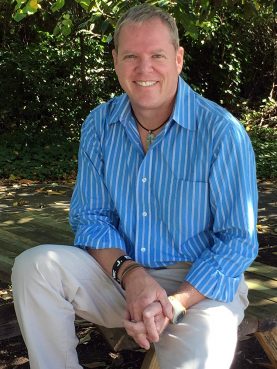
McKrae Game. Courtesy photo
Game, 51, founded and led Hope for Wholeness, a Spartanburg, South Carolina-based ex-gay ministry, until he was fired in 2017. He is just the latest in a long string of ex-gay leaders who now say the whole enterprise is fraudulent.
“I realized I have lived a role for everyone else, except me,” Game told Religion News Service.
Though he started out a zealot to the cause, Game said he slowly came to realize he could not change his sexual attraction to men. The most he could do was change his behavior. He did that, ultimately marrying a woman. He is still married.
But he also realized that repressing his attraction to men has negative consequences, which he saw in many of the men he counseled.
“Fighting your sexual orientation develops mental illness and other addictions and mental behaviors like depression, alcoholism, drug addiction, agoraphobic behaviors and eating disorders.” he said.
Game said the ex-gay Christian movement is a spotty and disjoined enterprise in the U.S. consisting of three large referral agencies: his former ministry, Hope for Wholeness; the Overcomers Network; and the Colorado Springs-based Restored Hope Network, a group whose members migrated from the shuttered Exodus International. Each network relies on smaller ministries across the country to which they refer people interested in disowning their sexual orientation.
All, he said, reject the term “conversion therapy,” which they view as a pejorative coined by the LGBTQ rights groups.
But most Christian groups that practice sexual orientation change are not licensed counselors, Game said.
“They get training from conferences and from workshop speakers and reading books and self-educating themselves,” he said.
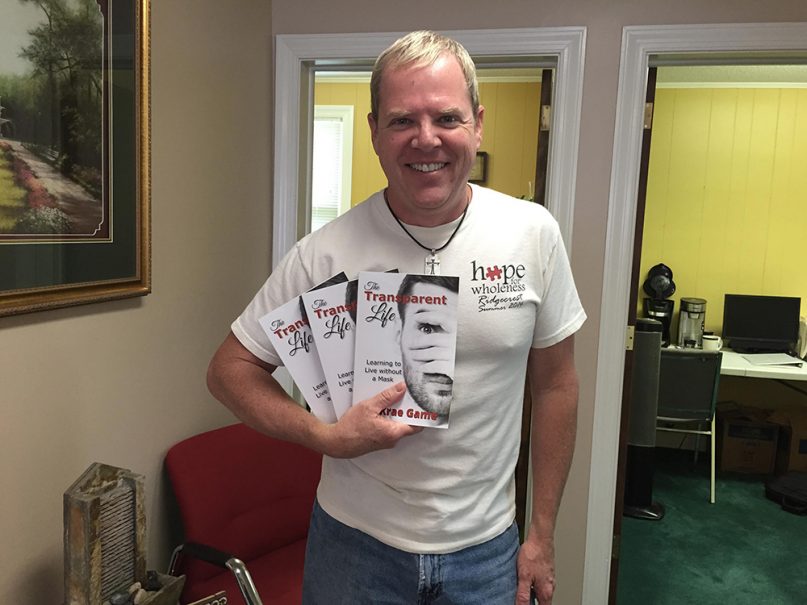
McKrae Game with his book, “The Transparent Life.” Courtesy photo
Many rely on the work of the late psychologist Joseph Nicolosi, who practiced what he called “reparative therapy,” which he proposed was caused by childhood alienation from either the father or mother, a process that interrupted a child’s normal masculine or feminine identity formation.
That theory has been debunked by every major medical and mental health association, including the American Psychological Association, the American Medical Association, the American Counseling Association, and a host of others. All have issued statements opposing the practice.
In the absence of trained clinical therapists, some churches have begun referring people with same-sex attractions to Celebrate Recovery, a popular 12-step program that churches have offered to help people suffering from addiction.
Warren Throckmorton, a professor of psychology at Grove City College in Grove City, Pennsylvania, who once supported conversion therapy but now opposes it, said he doesn’t know of any Christian training program that teaches people the practice of conversion therapy.
“That, to me, is a sign that it doesn’t have much vitality as a movement,” Throckmorton said. “If no one is training people in how to do it, then where are they getting their information and training?”
Others, such as Chambers, the former president of Exodus International, agreed.
“Conversion therapy has found some safety and comfort in this more conservative time period,” Chambers said. “Over the long haul it is still on the decline.”
Newer efforts to lead people out of homosexuality are more circumspect about what those efforts can and cannot achieve.
Leaders of the Changed platform, for example, acknowledge that some ex-gays still struggle with same-sex attraction.
Williams, the co-founder of the Changed network, seemed to acknowledge that his attraction to men is not entirely gone. He said he experiences “almost” no same-sex attraction.
“It’s a fraction,” he said. “There will be seasons where it’s none.”
He and Woning said they also support Christians who decide they prefer celibacy, believing the Bible allows and even encourages those who want to avoid sexual sin through abstinence.
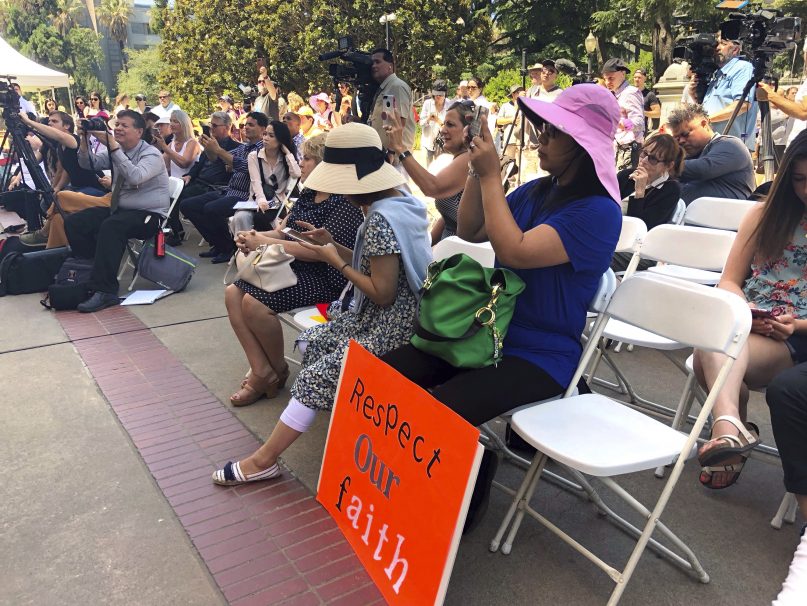
Opponents of a California bill to declare gay conversion therapy a fraudulent practice gather at a rally outside the Capitol as the Senate holds a hearing on the matter inside in Sacramento, Calif., on June 12, 2018. Opponents said the legislation could infringe on their religious freedom. (AP Photo/Sophia Bollag)
That the Changed platform emerged in California is perhaps not surprising given that the State Assembly, which is predominantly Democratic, has offered up a raft of bills to strengthen the ban on the practice. Woning said she and Williams traveled to Sacramento to protest some of those bills. Last year they testified in an Assembly committee hearing and staged a two-hour rally to demonstrate against a bill that would have classified conversion therapy as a fraudulent business practice. That bill was withdrawn.
At the most fundamental level, Woning said, she sees efforts to ban the practice as a matter of religious freedom.
“We should all have a right to shape our own personal sexuality as we feel led by our convictions,” she said.
Bethel Church, Woning said, does not contribute financially to the Changed effort, though it does pay their salaries. The group does not have nonprofit status and is housed in the Moral Revolution offices, an affiliate of Bethel, Williams said.
The church, which has outsize influence beyond its 5,000-member congregation, is a proponent of prophesy, healing, demon exorcism and other Pentecostal practices. It is perhaps best known for its Bethel School of Supernatural Ministry, an unaccredited program that draws 2,000 students from 64 countries. The church is also famous for its contemporary worship music label, Bethel Music, which is used in churches worldwide.
But the Changed leaders say they have a more modest goal.
“All that we can do is connect people to the loving, hopeful God we encountered and that we continue to know personally,” said Williams. “We want to help reconnect them back to the God that helped us.”
